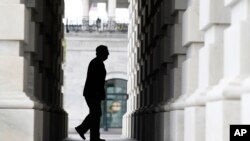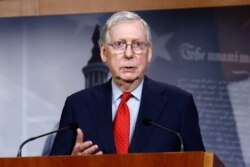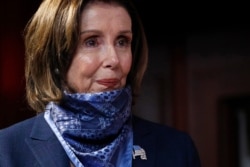The U.S. Senate returns to session Monday, more than five weeks after the coronavirus pandemic ended formal work on Capitol Hill.
While the U.S. House of Representatives delayed a return for at least one more week, leadership is examining ways to catch up either remotely or in person on the legislative branch’s essential oversight and spending powers.
House Majority Leader Steny Hoyer has already warned members to keep their schedules open to accommodate longer work weeks to make up for the time out of session.
Traditionally, Congress recesses in August and keeps a light schedule in the fall of election years to allow House members to campaign for reelection in their home districts. A third of the senators are also up for reelection this year and will need time to campaign.
The Senate has 15 weeks left in session, while the House has 13 weeks scheduled before Election Day on Nov. 3. Here are some of the key items on the congressional to-do list:
CARES 2 Act
In the span of two months, Congress has passed an unprecedented $3 trillion in aid to address the economic and public health crises caused by COVID-19. Even as they passed additional funding for the largest aid package in U.S. history last month, congressional Democrats said more funding would be needed. Negotiations for the CARES 2 Act are already consuming lawmakers’ attention, pushing other items further down the to-do list.
Senate Majority Leader Mitch McConnell has urged a cautious approach to the next round of funding, pushing back against Democrats’ calls for more funding for state and local governments. Republicans are calling for liability protections for businesses, while Democrats have called for $1 trillion in funding to keep essential workers employed.
House leadership cited ongoing CARES 2 Act negotiations as a reason to delay bringing the entire body back to Washington. Announcing the decision last week, Hoyer said that because CARES 2 was not yet ready for a vote, the risk of bringing all 430 House lawmakers back to Washington was too great.
Funding
Even as lawmakers negotiate a massive tranche of aid addressing the coronavirus, they must turn to their annual task of funding the U.S. government for the 2021 fiscal year. Negotiations over government spending have broken down twice during the Trump administration, notably resulting in a record 35-day partial government shutdown in 2018-2019. Given the massive uncertainty caused by the coronavirus, lawmakers are likely to find compromises to keep the government open, even if it means passing stop-gap funding measures.
In the meantime, Senate and House committees must proceed with markups of government agency budgets within their jurisdictions — a detailed annual undertaking now complicated by the fact that many of these committees are moving their work into virtual meetings.
House Minority Leader Kevin McCarthy proposed a staggered committee work schedule for appropriations in a May 4 plan outlining strategies for resuming work in the House.
“Precedence should be given to bipartisan COVID-19 response measures and other high-priority legislative items, such as the National Defense Authorization Act, Water Resources Development Act, and FY21 appropriations measures,” McCarthy wrote, naming the annual set of spending bills, as well as funding for the U.S. Department of Defense and a key set of laws protecting the nation’s waterways infrastructure.
Oversight
Last week, House Speaker Nancy Pelosi named her seven picks to the House Select Committee on the Coronavirus that will ensure the trillions of dollars in taxpayer money are spent responsibly. McCarthy is set to name Republican members of that committee this week.
While the Democratic-majority House has struggled to adopt a plan for remote voting, efforts to restart oversight hearings through a mix of virtual and in-person meetings have picked up pace recently.
The administration’s response to COVID-19 is set to receive an in-person examination by a subcommittee of the House Committee on Appropriations Wednesday. The White House blocked committee Democrats’ request for Dr. Anthony Fauci, a member of the coronavirus task force, to testify, while allowing him to appear in a similar coronavirus hearing in the Republican-majority Senate.
Nominations
The Senate returns to one of its key functions this week, resuming hearings for presidential nominations, including a hearing considering Congressman John Ratcliffe to become director of national intelligence. McConnell’s office said Senate lawmakers would hold floor votes on other national security and “mission critical COVID-19 nominees.”
But Senate Democrats have criticized the focus on nominees, in addition to placing protections for businesses in coronavirus aid.
“Senate Republicans should be laser focused on the health and economic crises caused by COVID-19, not confirming right-wing judges or protecting big business from legal liability,” Senate Minority Leader Chuck Schumer wrote on Twitter last Friday.
There are currently 82 administration nominees awaiting Senate confirmation, with a fraction of these having advanced through committee confirmation hearings. Last month, President Donald Trump issued a constitutionally dubious threat to adjourn Congress, citing Democratic obstruction of his nominees.
WATCH: Lawmaker COVID-19 decisions
Foreign intelligence surveillance
The House passed a compromise bill March 11 on the often-controversial Foreign Intelligence Surveillance Act (FISA), before leaving town to observe coronavirus social distancing measures. That bill, which extended surveillance authorities through 2023 while instituting some reforms, earned the endorsement of Attorney General Bill Barr, even as Trump issued a veto threat via Twitter.
The Senate passed a 77-day extension of existing authorities after senators Rand Paul and Mike Lee threatened to derail coronavirus aid negotiations while holding up the FISA compromise bill.
Pelosi was criticized for asking the House to act on the extension. Negotiations should resume soon — the existing authorities are due to expire on May 30.








